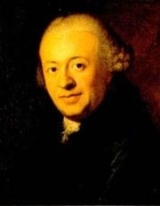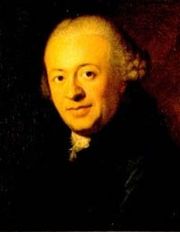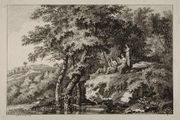
Solomon Gessner
Encyclopedia

Switzerland
Switzerland name of one of the Swiss cantons. ; ; ; or ), in its full name the Swiss Confederation , is a federal republic consisting of 26 cantons, with Bern as the seat of the federal authorities. The country is situated in Western Europe,Or Central Europe depending on the definition....
painter
Painting
Painting is the practice of applying paint, pigment, color or other medium to a surface . The application of the medium is commonly applied to the base with a brush but other objects can be used. In art, the term painting describes both the act and the result of the action. However, painting is...
and poet
Poet
A poet is a person who writes poetry. A poet's work can be literal, meaning that his work is derived from a specific event, or metaphorical, meaning that his work can take on many meanings and forms. Poets have existed since antiquity, in nearly all languages, and have produced works that vary...
. His writing suited the taste of his time, though by some more recent standards it is “insipidly sweet and monotonously melodious.” As a painter, he represented the conventional classical landscape.
Biography
He was born in ZürichZürich
Zurich is the largest city in Switzerland and the capital of the canton of Zurich. It is located in central Switzerland at the northwestern tip of Lake Zurich...
. With the exception of some time (1749-1750) spent in Berlin
Berlin
Berlin is the capital city of Germany and is one of the 16 states of Germany. With a population of 3.45 million people, Berlin is Germany's largest city. It is the second most populous city proper and the seventh most populous urban area in the European Union...
and Hamburg
Hamburg
-History:The first historic name for the city was, according to Claudius Ptolemy's reports, Treva.But the city takes its modern name, Hamburg, from the first permanent building on the site, a castle whose construction was ordered by the Emperor Charlemagne in AD 808...
, where he came under the influence of Ramler
Karl Wilhelm Ramler
Karl Wilhelm Ramler was a German poet.Ramler was born in Kolberg. After graduating from the University of Halle, he went to Berlin, where, in 1748, he was appointed professor of logic and literature at the cadet school...
and Hagedorn
Friedrich von Hagedorn
Friedrich von Hagedorn , German poet, was born at Hamburg, where his father, a man of scientific and literary taste, was Danish minister....
, he passed the whole of his life in his native town, where he carried on the business of a bookseller. The first of his writings that attracted attention was his Lied eines Schweizers an sein bewaffnetes Mädchen (Song of a Swiss to his armed maiden, 1751). Then followed Daphnis (1754), Idyllen (1756 and 1772), Inkel and Yariko (1756), a version of a story borrowed from The Spectator
The Spectator (1711)
The Spectator was a daily publication of 1711–12, founded by Joseph Addison and Richard Steele in England after they met at Charterhouse School. Eustace Budgell, a cousin of Addison's, also contributed to the publication. Each 'paper', or 'number', was approximately 2,500 words long, and the...
and already worked out by Gellert
Christian Fürchtegott Gellert
Christian Fürchtegott Gellert was a German poet, one of the forerunners of the golden age of German literature that was ushered in by Lessing.-Biography:...
and Bodmer
Johann Jakob Bodmer
Johann Jakob Bodmer was a Swiss-German author, academic, critic and poet.-Life:Born at Greifensee, near Zürich, and first studying theology and then trying a commercial career, he finally found his vocation in letters...
, and Der Tod Abels (1758), which Gessner called “a sort of idyllic prose pastoral.”

Pastoral
The adjective pastoral refers to the lifestyle of pastoralists, such as shepherds herding livestock around open areas of land according to seasons and the changing availability of water and pasturage. It also refers to a genre in literature, art or music that depicts such shepherd life in an...
. Britannica notes that his writings are marked by sweetness and melody, qualities which were warmly appreciated by Lessing
Gotthold Ephraim Lessing
Gotthold Ephraim Lessing was a German writer, philosopher, dramatist, publicist, and art critic, and one of the most outstanding representatives of the Enlightenment era. His plays and theoretical writings substantially influenced the development of German literature...
, Herder and Goethe
Johann Wolfgang von Goethe
Johann Wolfgang von Goethe was a German writer, pictorial artist, biologist, theoretical physicist, and polymath. He is considered the supreme genius of modern German literature. His works span the fields of poetry, drama, prose, philosophy, and science. His Faust has been called the greatest long...
. The New International Encyclopædia
New International Encyclopedia
The New International Encyclopedia was an American encyclopedia first published in 1902 by Dodd, Mead and Company. It descended from the International Cyclopaedia and was updated in 1906, 1914 and 1926.-History:...
(1905) finds his writing “insipidly sweet and monotonously melodious,” and attributes Gessner's popularity to the taste of a generation nursed on Rousseau
Jean-Jacques Rousseau
Jean-Jacques Rousseau was a Genevan philosopher, writer, and composer of 18th-century Romanticism. His political philosophy influenced the French Revolution as well as the overall development of modern political, sociological and educational thought.His novel Émile: or, On Education is a treatise...
.
Collected editions of Gessner's works were repeatedly published (2 vols, 1777-1778, finally 2 vols., 1841, both at Zürich). They were translated into French (3 vols., Paris, 1786-1793), and versions of the Idyllen appeared in English
English language
English is a West Germanic language that arose in the Anglo-Saxon kingdoms of England and spread into what was to become south-east Scotland under the influence of the Anglian medieval kingdom of Northumbria...
, Dutch
Dutch language
Dutch is a West Germanic language and the native language of the majority of the population of the Netherlands, Belgium, and Suriname, the three member states of the Dutch Language Union. Most speakers live in the European Union, where it is a first language for about 23 million and a second...
, Portuguese
Portuguese language
Portuguese is a Romance language that arose in the medieval Kingdom of Galicia, nowadays Galicia and Northern Portugal. The southern part of the Kingdom of Galicia became independent as the County of Portugal in 1095...
, Spanish
Spanish language
Spanish , also known as Castilian , is a Romance language in the Ibero-Romance group that evolved from several languages and dialects in central-northern Iberia around the 9th century and gradually spread with the expansion of the Kingdom of Castile into central and southern Iberia during the...
, Swedish and Czech
Czech language
Czech is a West Slavic language with about 12 million native speakers; it is the majority language in the Czech Republic and spoken by Czechs worldwide. The language was known as Bohemian in English until the late 19th century...
. In 1780 Gessner founded the Zürcher Zeitung (renamed Neue Zürcher Zeitung
Neue Zürcher Zeitung
The Neue Zürcher Zeitung is a major German language Swiss daily newspaper based in Zurich.One of the oldest newspapers still published, it originally appeared as Zürcher Zeitung, edited by Salomon Gessner, from January 12, 1780, and was renamed to Neue Zürcher Zeitung in 1821...
in 1821). Gessner's life was written by Hottinger
Hottinger
Hottinger or Hottinguer may refer to:*Henri Hottinguer , first born son of Rodolphe Hottinguer*Jay Hottinger , Republican member of the Ohio House of Representatives...
(Zürich, 1796), and by Heinrich Wölfflin
Heinrich Wölfflin
Heinrich Wölfflin was a famous Swiss art critic, whose objective classifying principles were influential in the development of formal analysis in the history of art during the 20th century. He taught at Basel, Berlin and Munich in the generation that raised German art history to pre-eminence...
(Frauenfeld, 1889); see also his Briefwechsel mit seinem Sohn (Correspondence with his son, Bern and Zürich, 1801). For Gessner's literary influence, see Texte, J. J. Rousseau and Literary Cosmopolitanism (New York, 1897)

